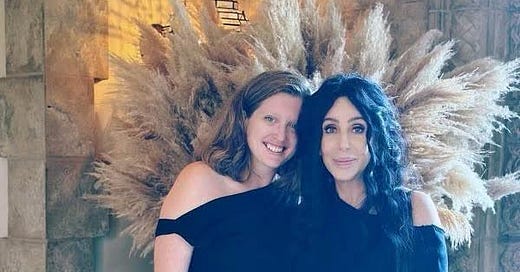On a Sunday afternoon in late August, Cher is, like so many of us, at home with a case of the Sunday scaries. On Friday, she was over the hill in Encino, shooting a commercial for Uber Eats Australia. In a month, she’ll release Forever, an album of greatest hits that covers her 60 years in music. But today, Cher is sitting in front of her computer with a stack of notes. The second half of her memoir is due, and she’s on a tight deadline.
“I’m working like crazy,” Cher says, getting comfortable on her sofa, looking out over the Pacific Ocean. When asked how many words she’s aiming to write each day, the icon shrugs. “Who the hell knows? I don’t know.” The answer is—a lot.
With a new album on the way, the world seems to be more enamored with Cher than ever before. A few months after our interview, the first half of her memoir will debut at No. 1 on The New York Times bestseller list. Just saying her name these days seems to make people smile. “Why do you think that is?” she asks before answering the question herself. “Maybe because I’ve been here for so long, I’m a part of your history.”
History is a theme not just in Cher’s memoir but also in her new advertisement for Uber Eats Australia. In a clever play on If I Could Turn Back Time, the ad sees Cher using Uber Eats to order a time machine that can send her back to the ’80s. Though, of course, she forgets to specify which 80s. As she tells it, Cher is, in fact, an Uber Eats customer. And what does she order on the app? She pauses before answering. “Wrinkle cream!” she says with a laugh.
Despite the concept behind her ad, Cher knows she doesn’t want to go backward—especially when it comes to the expectations placed upon women in America. First rising to prominence as one half of Sonny & Cher, she famously left her husband in 1975 to pursue a career of her own.
“That [situation with Sonny] was never going to work for me,” she reflects candidly. “My time with Sonny was tough—we went through a lot. I was ready to go long before I did. He was very old-fashioned, and I was sixteen. I didn’t know enough, and I made all my mistakes in front of everybody.”
In an era of Taylor Swifts and Charli XCXs, it’s important to remember how different the world was for female artists like Cher in the early ’70s. “Women just didn’t have freedom,” she says. “I didn’t get to pick my own material, and if you watched television, you saw what your position was and what being a good wife meant.”
It was this pressure to be a “good wife” that Cher’s mother, Georgia Holt, struggled with over the course of her life. As a young actress in Los Angeles, Georgia was so beautiful and talented that she nearly landed Marilyn Monroe’s breakout role in The Asphalt Jungle. When her acting dreams didn’t fully materialize, Georgia married instead.
“Back then, women traded their beauty for a husband with money,” Cher says—often with detrimental results. “I remember my dad beating my mom, and the police just telling him to walk around the block. I was little, but I always thought, What the hell is going on with all these people?”
Despite what she witnessed as a child, Cher does believe healthy, equal marriages are possible today. “You’ve got to demand your freedom—freedom of expression, life, liberty, and what you expect from a guy and what he expects from you. If it’s not equal, it ain’t shit.”
In a moment she’s mentioned many times over the years, Cher found herself in her kitchen, confiding in her mom about financing a project. Her mother’s advice was, in some ways, not surprising: “Honey, marry a rich man.” Cher’s reply was instinctual: “Mom, I am a rich man.”
She smiles as she retells the anecdote about her mother but turns serious when discussing the conversations surrounding women’s rights today. “Look, I’ve lived my life, but I don’t want to see your life be stunted,” she says, referencing the rise of regressive political movements and anti-abortion legislation in America. “These people want to see us in our place. If you don’t want to go back, then you’ve got to fight to go forward, because it seems like they want to put their thumb on the women.”
A longtime student of meditation, Cher is praying these days for our country—not just that abortion rights are protected and Americans can combat rising fascism, but that we can all learn to be a bit more accepting of one another. “I just want to see people move forward and not be so judgmental,” she says. “It’s like we’re always taking our internal temperature. Who are we better than? Who are we worse than? What do we strive for? And mostly, our role models are rich people.”
Cher knows the 1% are not who we should idolize. “It sounds corny, but [we should be admiring] the people who are helping, the ones who aren’t flashy but are doing good,” she says. “Growing up, I never wanted to be wealthy. I just wanted to be an artist.”
When told that, in this current climate, her life is the exact story we should be looking up to, Cher’s response is modest—quintessentially Cher. “Really?” She smiles, then—“Wait until you read the whole book… then you’ll say, How the hell did she get through that?”
But of course, whatever that is, we all know how she got through it. She got through it because she’s Cher.
A shortened version of this piece was published by Harper’s Bazaar Australia.





❤️